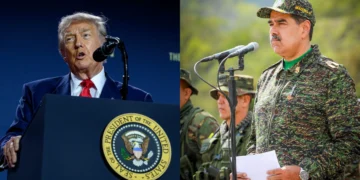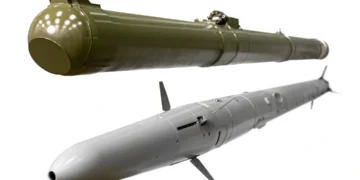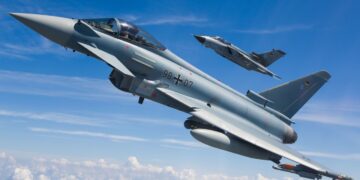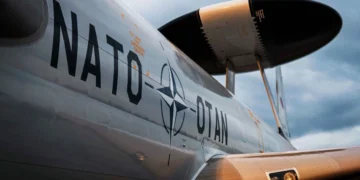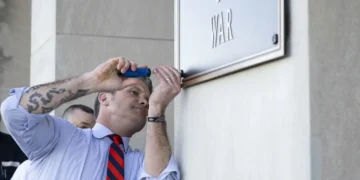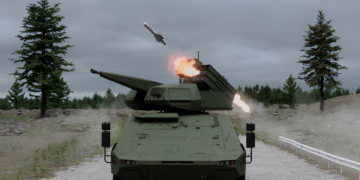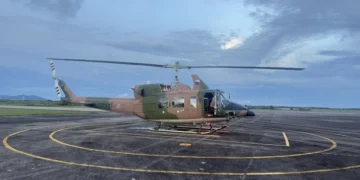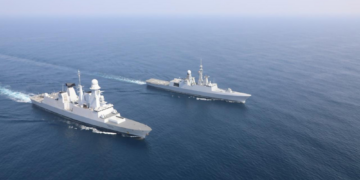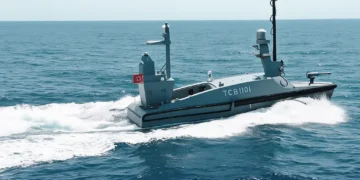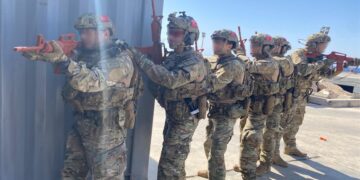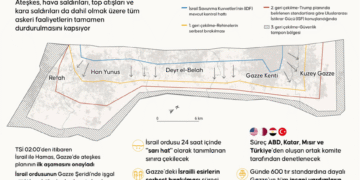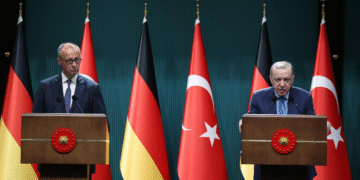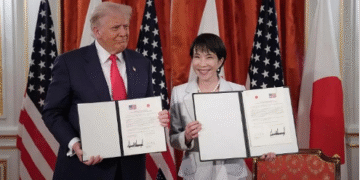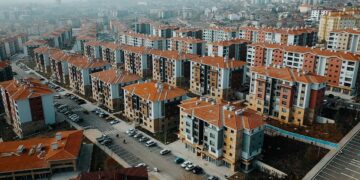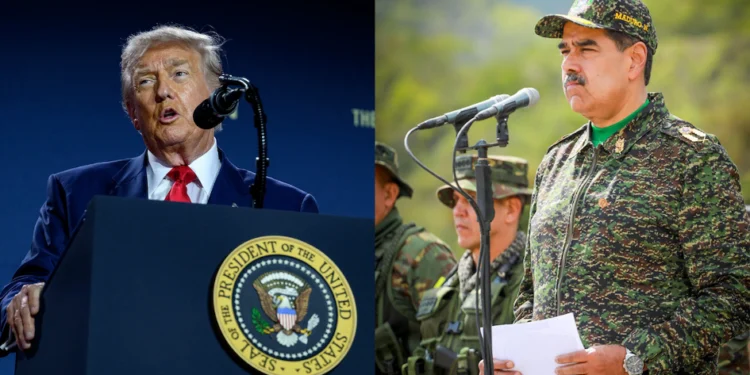“The American continents, by the free and independent condition which they have assumed and maintained, should no longer be considered subjects for future colonization by any European powers.” James Monroe[1]
Despite declaring independence from Great Britain in 1776, the young United States adopted two fundamental strategic arguments—enshrined in the Monroe Doctrine, which formed the basis for the defense of the mainland territory surrounded by two oceans—as the red line of its independence: the United States would not tolerate European intervention in the American continent, because the U.S. viewed the Americas as its own sphere of influence. In this context, Monroe declared that the American continent was closed to colonialism. As the 2026 New Year celebrations approach, will a new war break out in South America? Will the Maduro regime be overthrown?
The foreign policy and security understanding rooted both in the revolutionary past of the United States and in the year 1823, when Latin American states were brought under this scope, is breaking its silence two centuries later in the face of China’s geopolitical and economic challenge in the Caribbean Sea. Indeed, U.S. President Donald Trump delivered a dramatic speech on September 23, 2025, in which he openly threatened to “eliminate” individuals allegedly linked to drug trafficking. Perceived as a violation of international law and procedure, this statement referred to the latest escalation in the decades-long U.S. War on Drugs. Historically, this war had been used to legitimize U.S. foreign intervention in Latin America, and it is now targeting Venezuela. The United States has concentrated naval forces in the Caribbean. The Trump administration has carried out a minimum of twenty strikes on boats allegedly involved in drug trafficking. U.S. Army Secretary Dan Driscoll stated that the U.S. military would be “ready to act in Venezuela if requested.”
The United States and Venezuela are on the brink of war. On November 13, the Secretary of Defense announced that Operation Southern Spear had begun under the leadership of U.S. [3] Southern Command (SOUTHCOM) and a newly established joint task force created last month, with the objectives of “defending our homeland” and “removing narco-terrorists from our hemisphere.”[4] It was reported that U.S. President Donald Trump received a briefing to review updated options for a military operation in Venezuela. President Trump stated that he believed Venezuelan President Nicolás Maduro’s days were numbered and that ground attacks on Venezuela were possible. Over the past few months, the White House has intensified both its rhetoric and actions toward Venezuela. When asked, “Are Maduro’s days as president numbered?” Trump answered, “Yes, I would say so. I think they are, yes.”
As noted above, the Pentagon announced that, under what it calls Operation Southern Spear, the U.S. military deployed more than a dozen warships and 15,000 troops to the region. Throughout the past month, the Trump administration has launched a series of attacks on Venezuelan fishing boats, claiming they were conducting operations against drug traffickers.
The Primary Route of Drug Trafficking Is Not the Caribbean, but the Pacific Ocean
So what is the truth? Venezuela is widely considered a transit country for cocaine originating from neighboring Colombia, the world’s largest producer and one of only three cultivators along with Peru and Bolivia. The trafficking of fentanyl and other deadly illicit drugs into the United States by transnational organized crime groups has created a national emergency. This emergency has also led to a public health crisis that remains the leading cause of death for Americans aged 18–44. More than 40% of Americans know someone who has died from an opioid overdose, and in 2024, illegal drugs caused an average of more than 200 deaths per day in the United States. This is an unacceptable situation, and my administration is mobilizing every aspect of American power and unprecedented resources to eliminate this threat to our nation.
According to the United Nations Office on Drugs and Crime, the amount of cocaine seized in Venezuela accounted for 2.3% of the global total in 2020, while in 2023—the most recent data available—this figure fell to 1.9%. [6] It is unknown how much or what types of drugs were being transported on the targeted boats, or even whether they were carrying drugs at all, because the United States has released no evidence or details regarding the vessels or their contents. The UN has characterized these killings as extrajudicial executions. Most of the attacks occurred in the Caribbean. According to a 2020 report by the U.S. Drug Enforcement Administration (DEA), 74% of the cocaine that reached the United States came through the Pacific Ocean. The report stated that “only 8% of documented cocaine movements departing South America in 2019 went to Caribbean islands, mostly transported via go-fast vessels.”
On the other hand, as in most countries, U.S. interest in Venezuela is about strategic resources and power.[7] First, Venezuela possesses the world’s largest proven oil reserves as well as significant deposits of gold, coltan, and other critical minerals essential for technology and energy production. Control over these strategic resources means control over global markets and energy security. Second, Venezuela’s geographical position in Latin America makes it a significant point of leverage within the region. According to another perspective, the alliance between China and Venezuela is part of this broader project. Yet another view is that the U.S. decision to wage war against both countries represents a fierce reaction to the diminishing control of the United States over its hegemonic status—and, along with it, its ability to dictate the conditions of global resources, political power, development, and sovereignty for the rest of the world. [8]
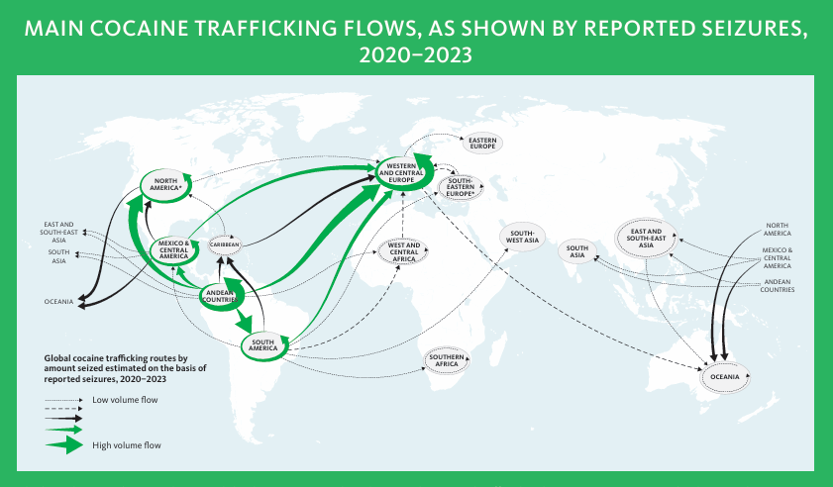
U.S. presidents have long promised to prioritize the Western Hemisphere; in other words, to put America above all else. Donald Trump is doing the same today. As the Pentagon masses aircraft and warships in the Caribbean, the world watches with anticipation to see whether Trump will strike Venezuela. But pressuring Nicolás Maduro’s autocratic, anti-U.S. regime is only one part of a larger campaign aimed at reestablishing America’s hegemony in the hemisphere. This campaign is rooted in history and supported by a solid strategic rationale. It is also filled with unanswered questions and serious risks.
U.S. presidents have long pledged to prioritize the Western Hemisphere—putting America, so to speak, first. Donald Trump is doing so again today. As the Pentagon deploys aircraft and warships to the Caribbean, the world anxiously wonders whether Trump will attack Venezuela. However, confronting Nicolás Maduro’s autocratic, anti-American regime constitutes only one piece of a broader campaign designed to restore U.S. dominance in the hemisphere. The roots of this campaign lie in history and in firm strategic logic. It is also laden with unresolved issues and substantial dangers.
In 2013, U.S. Secretary of State John Kerry declared that “the era of the Monroe Doctrine is over.” Not so fast—Trump has already brought it back. During his first term, his administration vowed to revive the two-century-old doctrine. It attempted, unsuccessfully, to liberate the region from Maduro. Trump began his second term with an inaugural address that sounded as if it had been lifted from the nineteenth century. Since then, he has been pushing a strong agenda of hemispheric supremacy. The administration pressured Panama to withdraw from China’s Belt and Road Initiative and to limit Beijing’s influence over ports along the Panama Canal. Trump has also extended an economic lifeline to Argentina in hopes of strengthening its pro-U.S., pro-market government and distancing Buenos Aires from Beijing. [9]
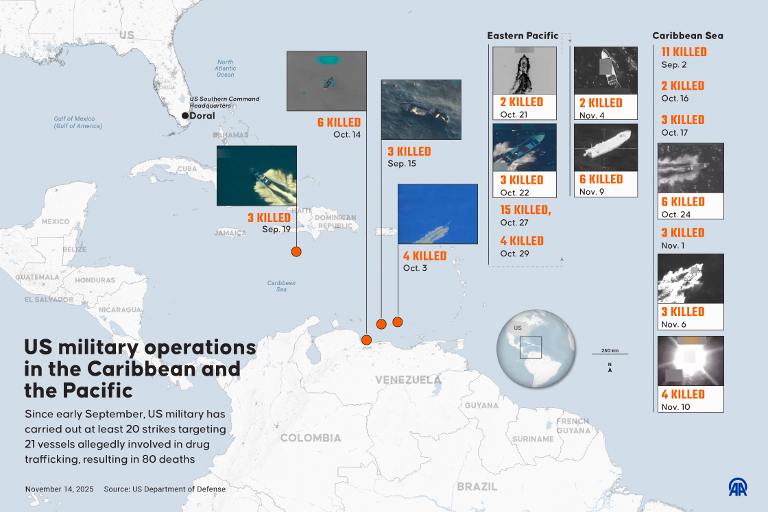
The U.S. Military’s Operation Against Drug-Trafficking Boats
Will the U.S. Military Use Force in the Caribbean Sea?
Donald Trump has sought to legitimize the military buildup and airstrikes by arguing that they are necessary to halt the flow of drugs from Venezuela to the United States. However, many analysts view these moves as a means of pressuring Maduro—who allegedly stole last year’s elections—to resign. The United States continues to increase its military presence in the Caribbean, enabling it to conduct targeted airstrikes against Venezuela with little or no warning.
The current rhetoric from Washington remains ambiguous, leaving open a wide range of possibilities for pressuring Venezuelan President Nicolás Maduro. If the United States were to choose to act against Venezuela, foreign nationals would have no good options for safely leaving the country. There are growing signs that Washington is gradually positioning national security assets to remove President Maduro if it deems necessary. Such a move could expose foreign nationals in Venezuela to the risk of being caught in the crossfire of an armed intervention.
Washington’s public focus on Venezuelan trafficking, despite limited supporting data, appears aimed at delegitimizing the Maduro government and portraying it as a transnational criminal threat. This sustains momentum for coercive diplomacy and possible regime-change measures. The recent announcement of renewed U.S. covert-action authorities targeting the Maduro government suggests that drug-related accusations may serve as both legal and political justification for broader pressure options.
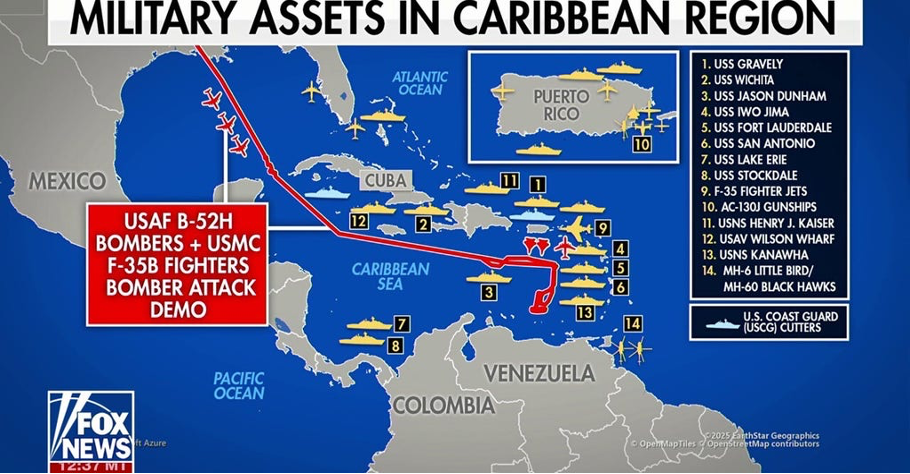
However, domestic political dynamics may shape how far the administration is willing to climb the escalation ladder. Meanwhile, in the U.S. Senate, Republicans rejected a bipartisan resolution that aimed to prevent President Donald Trump from going to war with Venezuela and from continuing the escalating series of military strikes on boats alleged to be engaged in drug trafficking in the Caribbean. [11] Opposing the resolution, Virginia Senator Tim Kaine argued that it relied on a legal justification previously used by other administrations—one that allows a president to go to war without Congress if he determines it is in the national interest. [12]
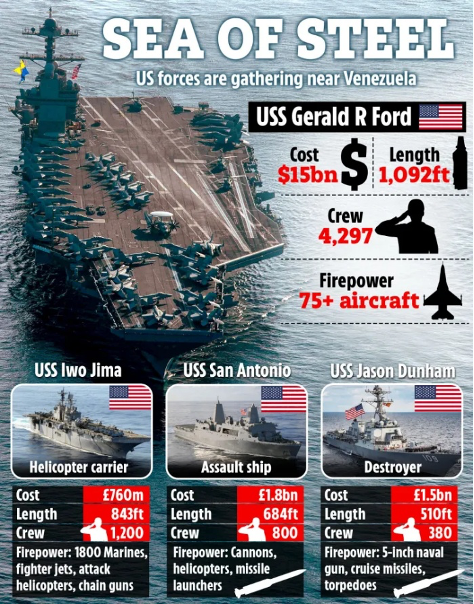
Although President Trump has denied having direct military plans, senior officials and recent intelligence leaks have left open the perception that an escalation may be imminent. In response, the Venezuelan government has increased military preparedness and announced a large-scale defense mobilization. Maduro and senior officials described these measures as protection against “U.S. imperial aggression,” using this narrative domestically to rally support and deter potential intervention. Venezuela’s key allies (Russia, Cuba, and Iran) have voiced political support, offered limited security cooperation in response to U.S. actions, and reiterated their backing of Maduro.
Although the possibility of limited strikes remains, current U.S. actions point to a broader pressure campaign intended to weaken the regime from within rather than trigger a full-scale conflict.
Washington appears determined to combine information and psychological operations, covert-action authorities, and economic pressure to erode the regime’s cohesion, increase elite defections, and weaken Maduro’s control over the military and security forces. Trump has threatened governments in Brazil and Venezuela that challenge U.S. power; punitive tariffs have been wielded as a stick against Mexico and Canada. He even symbolically renamed the Gulf of Mexico as the “American Gulf,” underscoring U.S. dominance in the southern region. The focal point of this assertive approach remains the confrontation with Venezuela. Trump has intensified lethal strikes against individuals suspected of narcotics trafficking. However, the fleet he has assembled, soon to be reinforced with an aircraft carrier, represents far more than what is required for counter-narcotics operations. Trump is advancing toward a coercive escalation aimed at forcing Maduro to flee, potentially culminating in an air campaign intended to forcibly dismantle the regime.
It appears that removing the Venezuelan government could have a domino effect across the hemisphere: it would increase pressure on Cuba and Nicaragua, two other autocracies supported by Russia and China, and encourage other countries to adopt swift, stringent measures against drug traffickers.
If President Donald Trump’s actions are any indication, the two-century-old Monroe Doctrine—viewing the Western Hemisphere as America’s exclusive sphere of influence—has once again become official U.S. policy. In the 1800s, the doctrine’s target was interventionist European powers inclined to meddle in what Washington considered its backyard. Today, the Trump administration is focused on the rising activities of China south of the U.S. border, fearing that Beijing may displace the United States from its long-standing position of dominance in the region.
However, the coercive approach embraced by Trump and his advisers threatens to weaken rather than strengthen the U.S. position in Latin America. As the United States alienates long-standing allies, China is positioning itself as an alternative. Trade between China and Latin American countries has surged, rising from $18 billion in 2002 to $450 billion in 2022, with China becoming the primary trading partner for some of the region’s largest economies, supplanting the United States. Investments are also increasing: from railways in Mexico to dams in Ecuador, China-backed companies have financed numerous infrastructure projects across the region. [13]
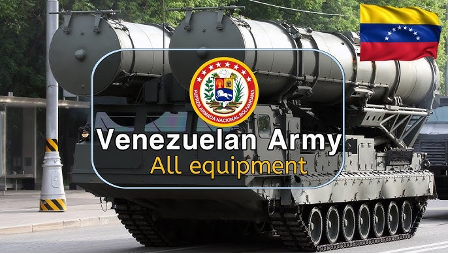
Since the early 2000s, China has extended tens of billions of dollars in loans to Venezuela, to be repaid with oil shipments. This allowed Venezuela to finance social programs and infrastructure while bypassing Western-controlled financial systems such as the IMF and World Bank. According to a U.S. Peace Institute report, “China’s industrial surge in the early 2000s created new opportunities for resource-rich trade partners in Latin America and Africa. Venezuelan President Hugo Chávez… was enthusiastic about China’s advances.”[14] As Washington increases its military presence in the region, analysts note that the declared objectives of the mission appear to be expanding and may not fully align with the capabilities of the deployed forces. [15]
Throughout history, like all great powers, China’s ambitions have grown alongside its wealth. Latin America, which Beijing largely overlooked in the 20th century, has become a target of China’s economic and political activities in the 21st century. U.S. forces could strike targets from a distant safe haven using Tomahawk missiles launched from ships and submarines in the Caribbean, or Joint Air-to-Surface Standoff Missiles (JASSMs) deployed from aircraft. Other munitions, such as GBU-53s or Joint Direct Attack Munitions (JDAMs) equipped with precision guidance kits, are shorter-ranged and require entering Venezuelan airspace. These would likely be delivered by stealth aircraft (B-2s or F-22s), although none have yet been reported in the region. Navy destroyers deployed near Venezuelan coasts could also provide naval gunfire support, similar to strikes against ISIS targets during the Libyan Civil War.
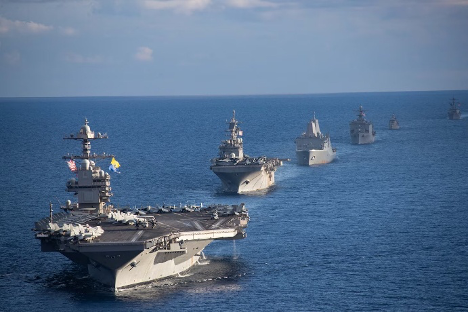
Venezuela possesses a small, limited air force. Of the 49 aircraft in its inventory, only 30 are operational. Due to U.S. sanctions and spare part shortages, very few F-16s remain airworthy. On September 4, two Venezuelan F-16s flew near a U.S. destroyer as a show of force, an action unlikely to be repeated since the Trump administration has deployed F-35s to the region. Venezuelan air assets and facilities, such as runways, would likely be among the first targets of a U.S. missile strike, rendering them unusable.
Venezuela’s air defense systems consist of a mix of old and new long-, medium-, and short-range systems. All are mobile, which would allow them to disperse from garrisons before a conflict begins, improving survivability. The S-300 and Buk systems are relatively modern and have been used in Ukraine, whereas the S-125, although older, is widely deployed globally. [16]

Point-defense systems, such as U.S.-made Stingers have short ranges but could make low-altitude U.S. operations, particularly helicopter missions, dangerous. In theory, Russia could supply weapons, munitions, or technical support, as it has in the past. Reports indicate that Maduro has contacted Russia for surface-to-air missile systems and spare parts to repair existing equipment. A Russian cargo plane recently arrived in Venezuela, likely carrying military supplies. However, Russia is militarily and politically preoccupied in Ukraine. Venezuela is geographically distant, limiting Russia’s capacity to assist, and Moscow cannot risk provoking the United States excessively. Consequently, Russian support provides Venezuela with little advantage.
President Donald Trump has indicated that the U.S. might engage in “some discussions” with Venezuelan President Nicolás Maduro. This unexpected statement, combined with the deployment of the USS Gerald R. Ford to the region, suggests the possibility of a diplomatic channel or ongoing back-channel negotiations. [17] The arrival of the Ford represents the largest U.S. military buildup in the Caribbean in generations. [18] With its presence, U.S. troop numbers in the region reached approximately 15,000. This deployment signals a far more ambitious objective than merely dismantling criminal networks or targeting individual smuggling vessels. [19]
Will the Regime Change Scenario Happen?
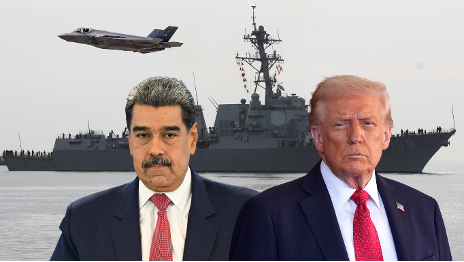
Today’s weak moral pretext is the war on drugs. The United States is reviving old regime‑change tactics in Venezuela. In Caracas, it is impossible to miss these signals. When the Nobel Committee awarded the Nobel Peace Prize to Maria Corina Machado on October 10, U.S. officials described it as a vindication of the Venezuelan opposition (they did not complain that the selection committee ignored the U.S. president). The question of how Trump will respond to the award remains unanswered, but he seems likely to interpret it as moral permission to act. Trump is trying to keep most of the machinery of power intact while avoiding the public backlash that followed the wars in Iraq and Afghanistan, by portraying interventions as part of a “war on drugs” rather than regime change. [20]
U.S. Secretary of State Rubio said at a press conference in Mexico, “The President of the United States will wage war on narco‑terror organizations. The President has declared that Tren de Aragua, the Cártel de los Soles, and other organizations are narco‑terrorists. These are defined by the U.S. as narco‑terrorist groups operating in international waters, whose purpose is to bring drugs to the streets of the United States.” Once targeted for assassination by Diosdado Cabello—the former figure of the “Cartel de los Soles” and current Venezuelan Minister of Interior, Justice and Peace—Secretary Rubio noted that a grand jury in New York composed of Americans had charged Cabello, Maduro, and others with drug trafficking. [21]
Although the slogan has shifted from “restoring democracy” to “combating drug terrorists,” the goal is the same: control of Venezuela’s oil. The methods pursued by the U.S. are familiar: sanctions that strangle the economy, threats of force, and a $50 million bounty on Venezuelan President Nicolás Maduro as if this were the Wild West. In 2023, Trump stated bluntly, “When I left, Venezuela was ready to collapse. We could have taken it over, we could have gotten all the oil… but now we’re buying oil from Venezuela, making a dictator very rich.” What is happening today is a typical U.S.-led regime-change operation dressed up in drug‑war rhetoric.
In March 2015, Barack Obama legalized a remarkable legal fiction. Obama signed Executive Order 13692, declaring Venezuela’s internal political situation an “unusual and extraordinary threat” to U.S. national security, triggering U.S. economic sanctions. This move laid the groundwork for escalating U.S. pressure. The White House has since maintained its claim of a U.S. “national emergency.” During his first term, Trump imposed increasingly harsh economic sanctions. [22]
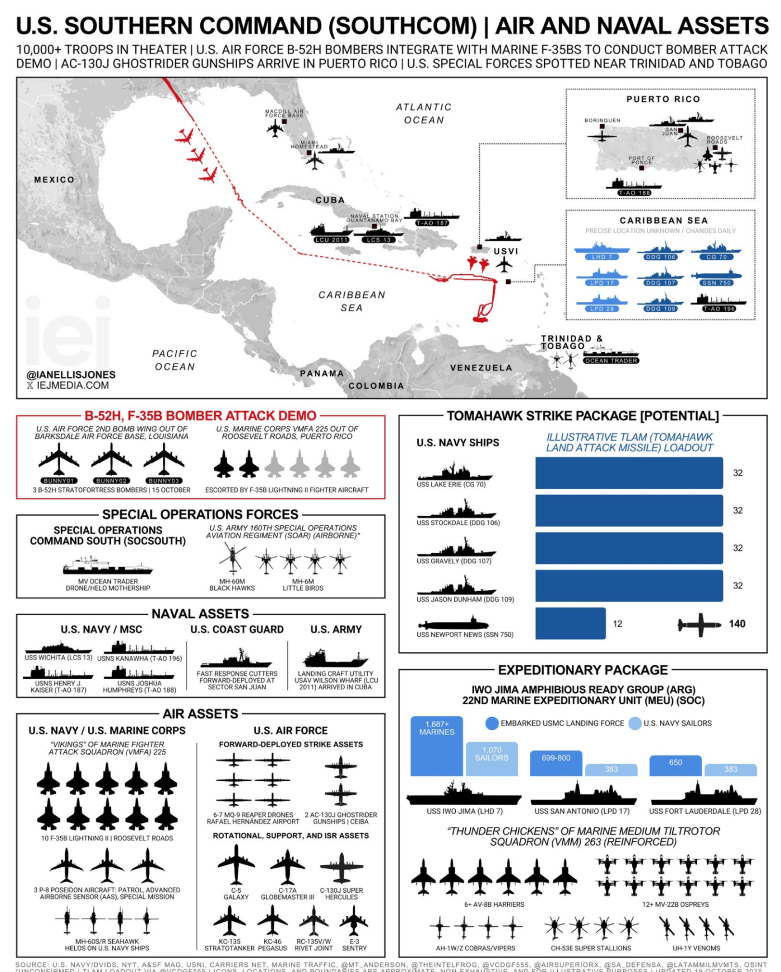
The current Venezuelan opposition group led by Edmundo Gonzalez—who, according to U.S. claims, was the winner of the 2024 presidential election—is said to have a 100‑hour plan to transfer the powers of the Venezuelan government from Maduro to Gonzalez. However, it should be remembered that when the Trump administration turned toward Caracas, it was reacting not only to Nicolás Maduro’s fraudulent 2018 reelection. [23] It was also conducting a modern experiment in coercive diplomacy, testing how far U.S. power could go without a single Marine setting foot on foreign soil. Washington attempted to build a coalition behind democratic restoration by recognizing opposition leader Juan Guaidó as Venezuela’s “interim president.” The plan was ambitious: combine sanctions targeting the oil sector, international isolation, and a symbolic flood of legitimacy for the opposition—until the Maduro regime buckled under the weight. But power rarely yields to symbolism alone.
While targeting the Maduro regime’s financial networks may be correct, on its own, the current U.S. actions may be insufficient to compel regime change. Former U.S. Southern Command Commander General Laura Richardson defined the strategic objective as: a “business generating $358 billion annually from drug trafficking, human trafficking, illegal mining, and logging.” General Richardson detailed how China’s Belt and Road Initiative has penetrated 23 out of 31 countries in Latin America and the Caribbean, controlling critical infrastructure such as power grids, ports, and 5G networks. She warned, “The first and second island chains reaching toward our country were built through this Belt and Road Initiative.”
Gray argued that confronting Venezuela cannot be separated from U.S.-China competition. “China and Russia are deeply engaged in this hemisphere in highly malign ways, and Venezuela, along with Cuba, is likely one of the most prominent channels through which they exercise this malign influence.” Richardson noted that Russian Foreign Minister Sergey Lavrov, Iranian officials, and Chinese representatives make regular high-level visits, creating a so-called “axis of aggressors” operating near U.S. shores. Comprehensive sanctions on Venezuela’s state oil company PDVSA not only strangled the regime’s finances but also devastated the country’s economic lifeblood. The failed mercenary operation, Operation Gideon, which Washington quickly disavowed, worsened the situation and confirmed for many Venezuelans that U.S. intervention is not merely political but existential. [24]
What emerged from this pressure campaign was a humanitarian disaster cloaked in soft power rather than a democratic breakthrough. Maduro survived. The opposition fractured. And America relearned an old lesson: regime change, even when rebranded as “maximum pressure,” still carries the same hubris and human cost. Reactions to Washington’s campaign revealed the shifting global order. Many European and Latin American governments initially sided with Guaidó, hoping U.S. pressure would open space for diplomacy. However, as sanctions expanded and humanitarian consequences deepened, sympathy gave way to skepticism. In the Global South, witnessing yet another U.S. regime-change attempt reinforced long-standing doubts about American intentions. Russia and China seized the opportunity to fill the void, offering struggling governments credit lines, oil swaps, and security advisors. In doing so, they turned Venezuela into both a sanctions-avoidance experiment and a symbol of post-Western defiance. [25]
Some analysts argued that the U.S. operation’s primary aim was to intimidate Maduro into exile and to compel the Venezuelan military either to overthrow him or forcibly remove him from the country, thereby installing a transitional government or one not under Maduro’s sovereignty. The Venezuelan regime announced a new phase of military deployment in response to what it called U.S. “imperial threats.” Defense Minister Vladimir Padrino stated that 200,000 troops participated in the exercise. Maduro accused the U.S. of “inventing a new war” and described the naval deployment as “the greatest threat our continent has faced in the last 100 years.”
Venezuela reportedly received Russian military equipment to strengthen its defenses, including missile and air-defense systems, reaffirming Moscow’s support for Venezuelan sovereignty. Maduro declared, “If Venezuela is attacked, we will engage in armed struggle and declare ‘an armed republic.’ The Bolivarian revolution is stronger and more resilient than ever. Our history is independent, resistant, free, and anti-colonial.” [26]
References
1https://www.coursehero.com/lit/Monroe-Doctrine/quotes/
2 https://www.blackagendareport.com/we-will-blow-you-out-existence-trumps-caribbean-spectacle
3 ttps://www.msn.com/en-us/news/world/trump-has-suggested-he-s-made-a-decision-on-venezuela-military-operations-here-s-what-we-know/ar-AA1QvpK6?uxmode
4 https://www.csis.org/analysis/trumps-caribbean-campaign-data-behind-developing-conflict
5 https://foreignpolicy.com/2025/11/07/trump-maduro-venezuela-democracy-intervention/
6 https://www.state.gov/releases/office-of-the-spokesperson/2025/09/presidential-determination-on-major-drug-transit-or-major-illicit-drug-producing-countries-for-fiscal-year-2026
7 https://www.theguardian.com/world/2025/nov/12/us-venezuela-trump-maduro-drugs-regime-change
8 https://www.counterpunch.org/2025/11/11/the-u-s-war-on-china-venezuela-and-the-international-left/
9 https://www.aei.org/op-eds/the-us-may-conquer-the-americas-but-lose-the-world/
10 https://www.nytimes.com/2025/11/04/us/politics/trump-weighs-attacks-venezuela.html
1 https://www.crisis24.com/articles/us-ramping-up-pressure-on-venezuela-signaling-possible-escalation
2 https://www.courthousenews.com/senate-scuttles-war-powers-resolution-blocking-trump-strikes-on-venezuela/
3 https://www.defensepriorities.org/opinion/trumps-coercive-approach-risks-driving-latin-america-into-chinas-arms/
4 https://www.counterpunch.org/2025/11/11/the-u-s-war-on-china-venezuela-and-the-international-left/
5 https://www.aljazeera.com/news/2025/11/14/is-venezuela-prepared-for-a-us-attack-as-washington-ramps-up-forces
6 https://www.csis.org/analysis/trumps-caribbean-campaign-data-behind-developing-conflict
7 https://abcnews.go.com/US/wireStory/us-aircraft-carrier-arrives-caribbean-major-buildup-venezuela-127572594
8 https://tr.euronews.com/2025/11/17/trump-karayiplerdeki-abd-askeri-varligi-artarken-maduro-ile-olasi-gorusmelere-isaret-etti
9 ‘’WorldView: Trump ups the ante in Venezuela standoff ‘’,
https://www.washingtonpost.com/world/2025/11/17/trump-venezuela-standoff-maduro-regime/
20 https://www.resetdoc.org/story/trumps-power-politics-latin-america-beyond-venezuela/
2 https://floridianpress.com/2025/10/is-trump-inching-closer-to-dropping-bombs-on-maduro/
22 https://indepthnews.net/venezuelas-oil-us-led-regime-change-and-americas-gangster-politics/
23 https://edition.cnn.com/2025/11/15/politics/trump-maduro-removal-venezuela
24 https://floridianpress.com/2025/11/experts-say-u-s-venezuela-strategy-right-to-target-maduros-financial-drug-lifeline-but-not-enough-to-force-regime-change/
25https://moderndiplomacy.eu/2025/10/31/trumps-venezuela-experiment-regime-change-not-through-force-but-finance/
26 https://www.aa.com.tr/tr/dunya/maduro-venezuela-son-100-yilda-kitamizda-gorulen-en-buyuk-tehditle-karsi-karsiya/3675727




